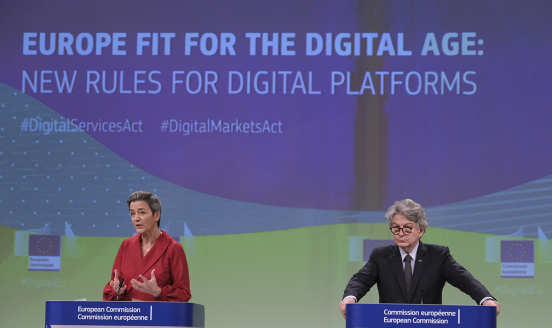Standard-setting abuse: the case for antitrust control
The issue: Standards reduce production costs and increase the value of products to consumers. Think about mobile phones: using the same technolog
The issue: Standards reduce production costs and increase the value of products to consumers. Think about mobile phones: using the same technology allows anybody who owns a mobile phone to call or be called by any other mobile phone owner. The bigger the network, the better for consumers.
Standards however entail risks of anti-competitive abuse. Adopting a standard means that all potentially competing alternatives to the chosen technology become obsolete. Companies that own patents essential to that the chosen technology suddenly become unavoidable partners: if you want to produce a mobile phone, you need to get access to that patent. To prevent patent holders from charging monopolistic prices, standard-setting organisations require those companies to commit to fair, reasonable, non-discriminatory (FRAND) rates. Once the standard is adopted, the price they charge to access their technology should therefore be ‘fair’.
The European Commission approach. The European Commission recognises the crucial role of standardisation, but has been wary about the risks that standardisation might entail, particularly in respect to potential loss of competition. Guidelines published in 2011 on the application of Article 101 of the Treaty on the Functioning of the European Union (TFEU) to cooperation agreements dedicate an entire section to standardisation. The Commission's Directorate-General for Competition, which is in charge of enforcing competition law in the EU, is also investigating, or has investigated, a number of cases of abuse of dominant position. The Samsung and Google-Motorola cases, for example, concern alleged abuses of patents deemed essential for the 3G mobile phone standard. The two patent holders are suspected of not abiding by their FRAND commitments by seeking injunction relief in an attempt to block Apple’s or Microsoft’s handset sales.
The limits of the European Commission’s approach. When antitrust enforcement implies direct intervention in pricing, practitioners raise their eyebrows. Defining what is fair is an extremely complex task: competition authorities may lack the tools to perform it. Competition authorities would instead normally act on markets, make them work properly and allow them converge by themselves to a ‘fair’ equilibrium in which consumers’ welfare is maximised. Moreover, intervening directly in pricing entails a huge risk: it may wipe away profits that reward previous investments in research and development. If the price is expected to be too low, investing to develop future technologies might simply be not worth the risk.
For that reason, the Commission has been prudent in the past and has always somehow anchored its intervention to suspected violations of standard-setting rules, such as alleged FRAND infringements. However, this approach has limits. First, it makes antitrust action dependent on contractual agreements between companies (and one may wonder whether courts, and not antitrust authorities, would be more suited to deal with such issues). Secondly, it risks ignoring other potential sources of harm. For example: after the adoption of the standard, a licensee with deep pockets might threaten a small patent holder to bring it to court and enforce its FRAND commitment. If the patent holder is financially weak, it might end up simply accepting rates that are lower than the ‘fair’ value, because it could be too risky to enter costly and lengthy court proceedings against a strong counterpart. But low prices can also harm consumers, because, anticipating that risk, technology developers may simply refrain from supplying the economy with new and better technologies in the future if the investment is not worth the trouble. The economic literature has convincingly shown that, independently of the quality of their technology, smaller patent holders get lower rewards. This phenomenon is called ‘reverse hold-up’. But the current practice of the European Commission does not tackle that risk, since licensees are not required to commit to FRAND. Therefore, no FRAND infringement from their part is possible.
The solution. Article 102 TFEU guarantees a legal basis for intervention against unfair pricing. At the same time, the key factor that should trigger an antitrust inquiry is if the adoption of a standard has significantly altered the distribution of bargaining power between patent holders and prospective licensees. When such a distortion is identified, antitrust scrutiny should be warranted if there is a risk of harm for consumers, regardless of the existence of FRAND commitments. An increase in bargaining power that is only due to the restriction of competition and not to the ‘pro-competitive’ merits of a market operator (such as having developed an extremely valuable technology) should not be used to extract better pricing conditions without being considered a breach of competition law. Identifying the increase in market power and establishing the correct competitive alternative scenario is a complex but not impossible task that competition authorities are capable of performing, given the powerful inquiry instruments they are endowed with.
Focusing on the shift of power resulting from the adoption of the standard allows the risk most feared by non-interventionists to be avoided: that the rewards arising from investment in innovation will be wiped out. In fact, if, before the adoption of the standard, a technology is already recognised as the only truly viable technology for the industry, the adoption of the standard might not lend any significant additional market power to patent holders. De facto, patent holders already held market power before the adoption, if their invention was already so successful. If that is the case, then no unfair pricing abuse should be considered to have taken place. Or, in other words, pursuing an abuse would, under those conditions, run the risk of unduly penalising an already successful technology, just because it was formally recognised as the standard. Likewise, the adoption of a standard might not empower a licensee that lacks the financial strength to threaten a patent holder with litigation over a FRAND commitment during the negotiation process, thus forcing it to accept a too-low access price. In those circumstances, unfair pricing abuse cases should not be pursued.
This approach has several advantages. Most importantly, it eliminates the dependency link between competition authorities and the rules of standard-setting organisations, which might not always minimise anti-competitive risks, and it would be capable of tackling all potential sources of harm due to the restriction of competition determined by the adoption of the standard. There is a significant number of potential or actual market players that could be strongly affected by unfair pricing abuses. This is particularly true in the case of smaller players, which are more vulnerable to abuse (they are more sensitive to changes in revenues or costs and they find it more difficult to access the courts to preserve their legitimate claims), and which may represent significant shares of the relevant markets. A symmetrical approach towards excessively high and excessively low access prices is ultimately the best way to achieve competition policy's objective: maximisation of consumer welfare, in the form of lower prices today and greater innovation tomorrow.



